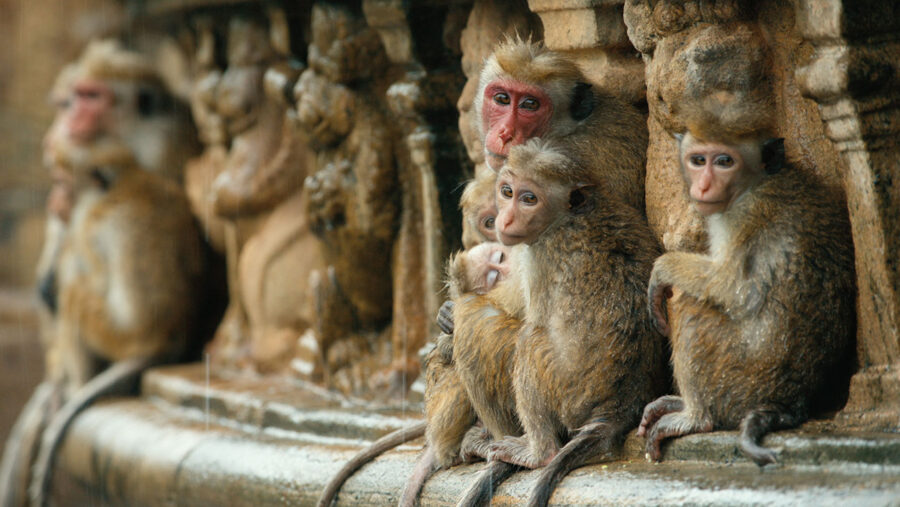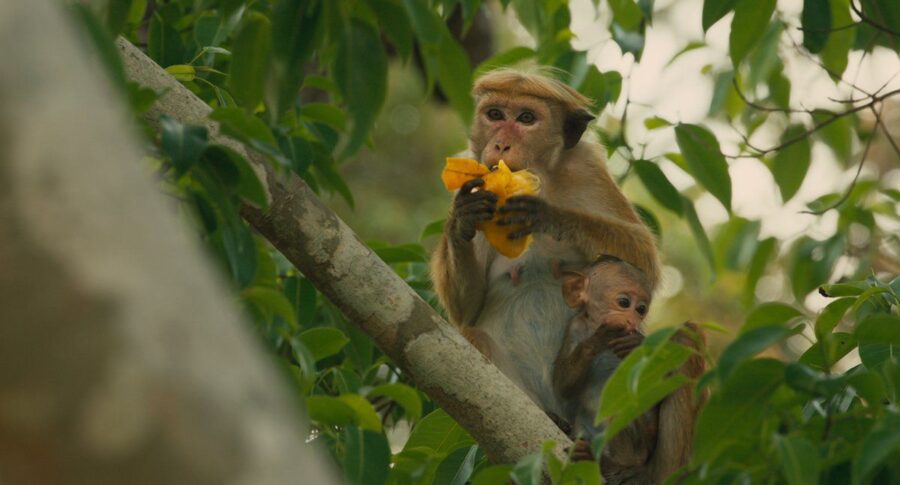Monkeys Are Stealing Cell Phones And Holding Them For Ransom
The macaque monkeys in Indonesia are smart enough to tell which possessions are important to visitors, steal them, and hold them ransom for food.
This article is more than 2 years old

For those who are planning to visit the Uluwatu Temple in Bali, Indonesia be forewarned. The long-tailed macaque monkey is lurking in the trees, waiting to pounce on unsuspecting visitors and take what they hold near and dear.
The macaque monkey calls Indonesia home, but can also be found in Southeast Asia from Burma to the Philippines and south in Indochina, Malaysia, and Indonesia. It was recently studied by researchers from the University of Lethbridge, Canada, and Udayana University, Indonesia that came to the conclusion that the Uluwatu Temple macaques are smart enough to tell which possessions are important to visitors, to the point that the macaque will remove said possession and hold onto in exchange for food.
The study, which was published in the Royal Society Journal, was conducted over a 273-day timeframe in 2015 and 2016, with further research done in 2019. What the study shows is that not only are the monkeys smart enough to be able to take objects and hold them for ransom, but they are now also able to differentiate which items are more valuable than others, thus giving them a better chance at a higher reward. The macaque monkeys are now aiming for high-quality items such as cell phones, wallets or purses, tablets, cameras, and even prescription glasses.

“These monkeys have become experts at snatching them from absent-minded tourists who didn’t listen to the temple staff’s recommendations to keep all valuables inside zipped handbags firmly tied around their necks and backs,” Dr. Jean-Baptiste Leca told The Guardian. Leca is an associate professor at the University of Lethbridge and the lead author of the study.
For their study, the researchers filmed over 2,000 interactions between the monkeys and visitors to the temple and saw that the monkeys would go for higher value items and hold out for long periods of time before they got what they wanted. Many times, the temple staff would have to step in to help negotiate. The longest period of time it took to convince the monkey to return the item was 25 minutes. For lower-value items, the monkey would return it faster upon receiving what it felt like proper compensation.
The study also showed that the older the monkey, the better they were at negotiating. Age and experience have their benefits for the macaque monkeys. The authors said there were “clear behavioral associations between value-based token possession and quantity or quality of food rewards rejected and accepted by subadult and adult monkeys,” and that the older monkeys “preferentially” selected items with a higher value.

“Token-robbing and token/reward-bartering are cognitively challenging tasks for the Uluwatu macaques that revealed unprecedented economic decision-making processes,” the authors said about the monkeys via CNN. “This spontaneous, population-specific, prevalent, cross-generational, learned and socially influenced practice may be the first example of a culturally maintained token economy in free-ranging animals.”
Don’t think it’s only the Uluwatu Temple macaques performing these dastardly deeds. In the Hindu temple town of Vrindavan located in north India, the macaque there performs the same thievery – sometimes violently – waiting to negotiate a food ransom. They also made headlines recently when the monkeys violently attacked a laboratory tech on the campus of Meerut, a state-run medical college, stealing blood samples of patients who tested positive for COVID. “Monkeys grabbed and fled with the blood samples of four COVID-19 patients who are undergoing treatment … we had to take their blood samples again,” said Dr. S. K. Garg, a top official at the college, via Reuters. Those blood samples were never found.
Human-monkey conflicts are not new, but they do seem to be increasing as time goes by with most of the monkey culprits being macaques. The macaque was called a topeng monyet, which translates to a “masked monkey,” which are street performers who are usually controlled by a handler. The monkeys are chained or is controlled by a cord and if it gets too close, the handler yanks on it. According to the video, when the monkey latches on to the baby, it doesn’t let go as the handler pulls it away, causing the baby to be dragged with it.

But if you’re ever near a group of macaque monkeys, be careful to keep your valuables close by, or at least have a food ransom ready to go.












